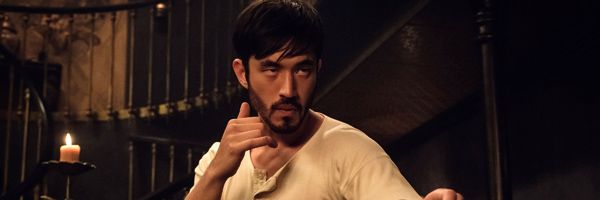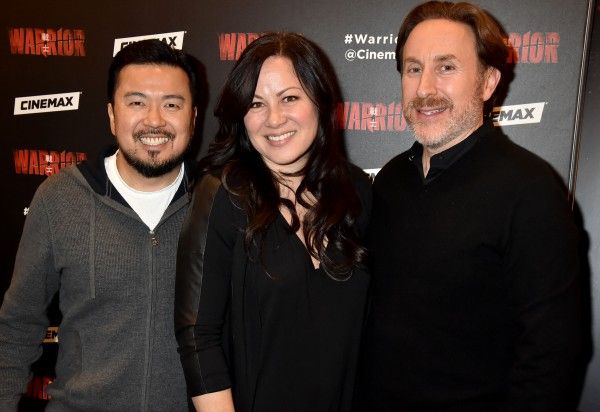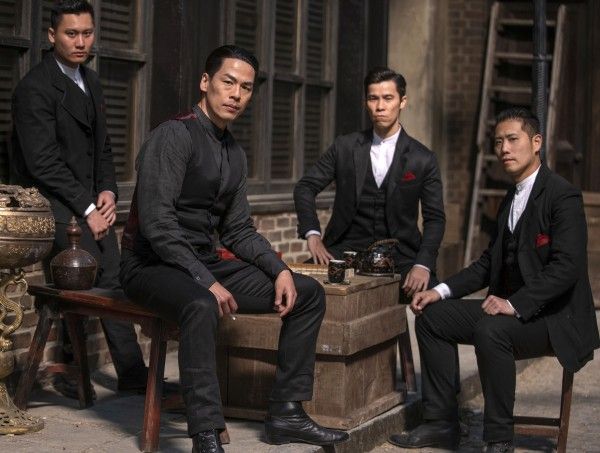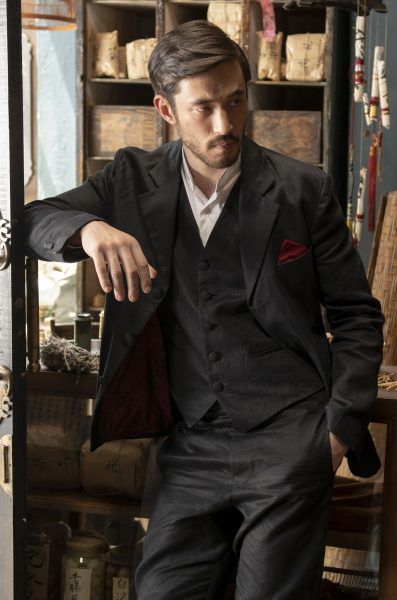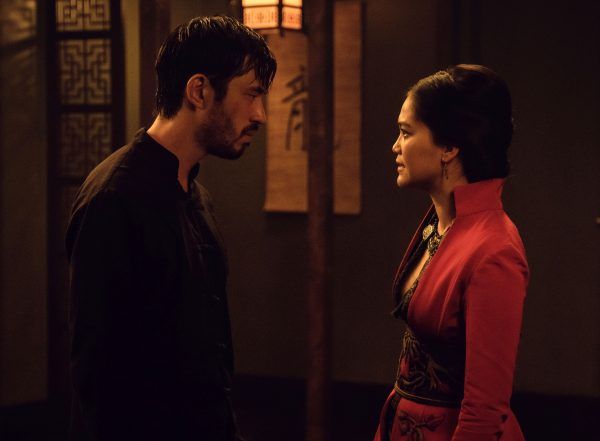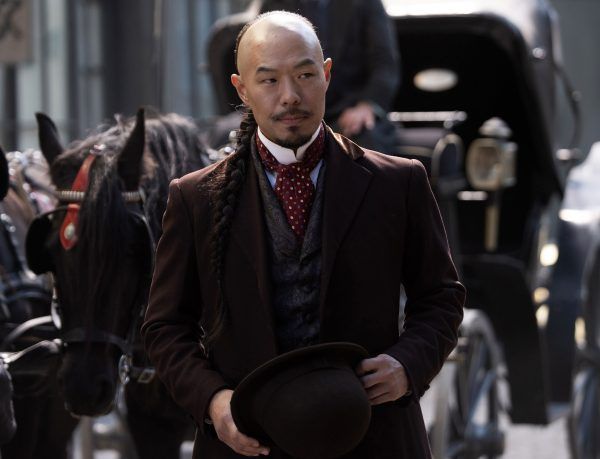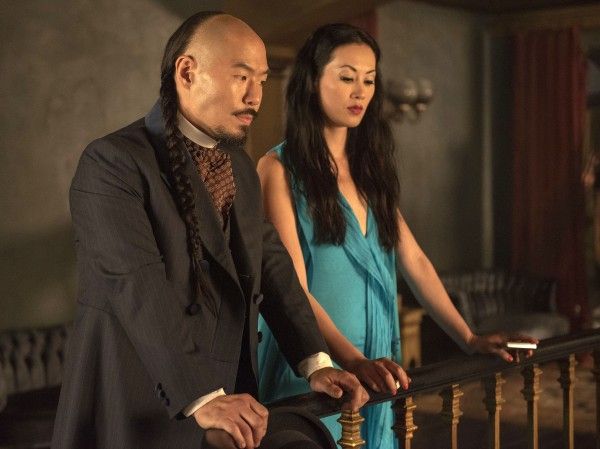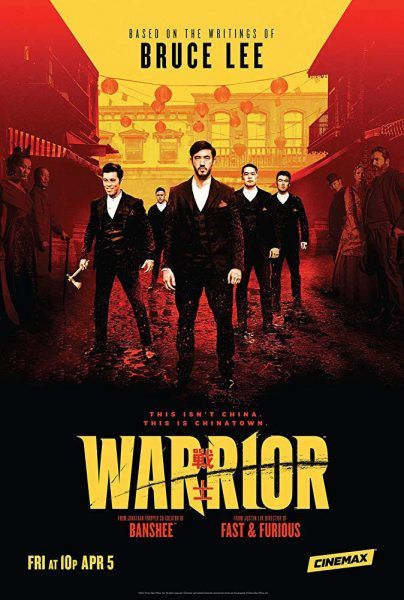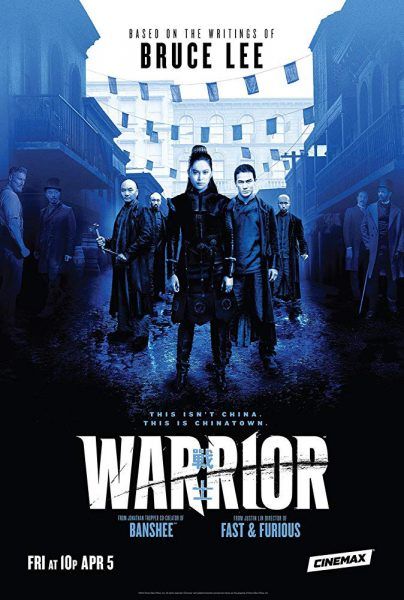In the 10-episode Cinemax action-packed drama series Warrior, based on writings from martial arts legend Bruce Lee and set during the brutal Tong Wars of San Francisco’s Chinatown in the second half of the 19th century, follows Ah Sahm (Andrew Koji), a young man who’s left China behind for San Francisco under mysterious circumstances, only to realize just how challenging that can be. Now that he’s become a hatchet man for one of Chinatown’s most powerful Chinese organized crime families, violence is erupting all around him and he must decide which boundaries are worth crossing and which might be too dangerous to survive.
During this 1-on-1 phone interview with Collider, Shannon Lee (executive producer for Bruce Lee Entertainment) talked about shepherding her father’s legacy, the challenges of the business side of that, the 50-year journey that Warrior has taken, her reaction when executive producer Justin Lin approached her about this project, what made Jonathan Tropper (Banshee) the perfect showrunner, how this series has surpassed her expectations, what she’s most proud of when it comes to the finished product, and her desire to keep telling this story for awhile longer (the series has already been picked up for Season 2).
Collider: What does it mean to you, to not only have a hand in making this bad-ass TV series that your father had always wanted to make, but also be able to teach people a thing or two about history, in the process of it?
SHANNON LEE: It’s an amazing opportunity. We’re doing the thing that my father was always trying to do in his life, which is make highly entertaining action-packed drama, but also with important cultural and philosophical information. This is really an extension of his legacy, in that regard. And it was very important to my father that this show be set in this time period because he wanted to tell these stories. He wanted to highlight this aspect of history and a Chinese American experience. I’m thrilled, beyond belief, to be able to have the best of both worlds, in some ways.
What’s it like for you to be the person who shepherds this legacy? It’s your family’s legacy, but it’s also a legacy that’s so important to so many people.
LEE: There are definitely challenges. It’s not all just pie and champagne, or roses, or whatever the thing is. The thing is that I just have to be true to myself, in the shepherding of this legacy, because I know, for myself, what I think this legacy is, what’s important about it, and what the energy of it is. And so, when I make those decisions about how to move forward, it’s with all of that in mind. There are a lot of people who have opinions about what I should be doing and how I should be spending my time, and that’s lovely that they have those opinions, but for me, I have to do what I think is not only right for me and my father, but also what speaks to me and my heart, in all of this. If I didn’t have that, then it would really feel like a chore.
Did it take you time to get to that place, or have you always felt like you had a very clear idea of what that legacy should be?
LEE: It’s both. When my mom came to me, in the late ‘90s, and said, “Do you have any interest in looking after your father’s legacy?,” my immediate answer was, “Yes.” And it was yes because I just felt like some of the points of him and who he was were being missed and not amplified enough, out in the world, through the current ways in which things were being done. His life and his words had been and are so meaningful to me that I wanted to amplify that, out in the world. And when I first started doing it, there were a lot of things that were really hard. It was really hard to not take business stuff personally because people treat this like a commodity, but that’s my dad. There was just a lot of just emotional stuff to wade through and orient myself with. In the beginning, it was also very hard to focus because there’s so much possibility and so much that can be done, but not all of it should be. There are a lot of people that are coming to you with requests and things that they want, and you have to weed through that while also focusing and figuring out what’s important and how to move forward, and that has been a continuing process. We’re getting better at it, as we go forward, but I’ve been doing this for almost 20 years, and the first decade was a lot of clean-up and set-up that had to be done. Now, it’s a lot about that focus and trying to really get clarity around what it is that we really want, and putting those pieces in motion, in the best way to really amplify his legacy, out in the world.
That’s awesome, but it seems like a huge challenge.
LEE: Yeah, it’s a lot, and there’s also a lot of not fun stuff involved, like legal issues and challenging personalities, and things like that, that come with the territory of all of this. But for me, I have a real desire and love for being creative, and the challenge of this is a creative challenge. It’s like, how do I create these things and move them forward, in a way that is both positive and satisfying, for me personally, as well for the legacy itself?
You’ve previously talked about how you knew about this treatment that your father had written and that you had it in your archives, but it doesn’t sound like you were actively pursuing getting it made. Why did it take Justin Lin reaching out to you, to finally get you to take it out of a box and get serious about actually making it?
LEE: This isn’t the only treatment that my father has written, so there were many possibilities. And then, for a long time, we were much more in reactive mode. People were coming to me, all the time, and saying, “Hey, we want to make this project,” and there were some documentaries that got made. We’re a very small outfit, so there’s only so much bandwidth and focus that we have. There were parts of the legacy that we also needed to focus on. The charitable aspects were really important to me, as well as having to get the licensing part of things up and running. Production is just one facet of what we do. It took a really long time for me to make headway in entertainment production for my father because most people view me as somebody that they need to get out of their way, and not as someone that they need to collaborate with. A lot of people want to do stuff with Bruce Lee, but they want to pay me a fee and have me go away, as opposed to being involved. And so, I think that the difference with Justin was that he had the ability and mojo, or whatever you want to call it, in Hollywood to actually get a project made, which is important. There are people who say that they can get projects made, but then they can’t. And he wanted me to be involved. He said, very specifically, “If we can’t do this the right way, then we shouldn’t do it. We should really think about your father’s idea, honor that idea, honor his legacy, create something we really believe in, flesh out this story in the best way possible, get the best possible cast, and all of that. If we can’t try to line up some of those major pieces, then we shouldn’t do it because then it would just be a waste.” And that was music to my ears.
Did you meet with a variety of possible showrunners for this, or was it always Jonathan Tropper?
LEE: Yeah, we did meet with some other writers and hear some other thoughts, but Cinemax was one of the networks that we were talking to about the possibility of this show living there, and Jonathan just happened to be finishing the final season of Banshee. Cinemax had an exploratory conservation with him, to see if this would be something that he would be interested in, and as it turns out, Jonathan is not only a big Bruce Lee fan, but he’s also a black belt. He’s been a martial artist, for many years. I think, to him, this was a really exciting and fun opportunity to get to do something with Bruce Lee and satisfy his 14-year-old self, who was a big fan and a big martial arts enthusiast. He was super excited. And so, Jonathan and Justin and I all got together and talked through the treatment. Jonathan went away and thought about it, and then came back with his thoughts and ideas. I remember there was a point in time where we were having a discussion in Justin’s offices about the arc of the story, and all of the different storylines and characters, and I had one of those out of body moments, where you stand back and look at the room, and I was like, “This is really gonna be good. This is exciting. I just have a good feeling about all of this.” It just was a natural fit. He was not only enthusiastic, but had a lot of great ideas, and he really got what we were trying to do.
The idea for this series has been around for 50 years, before finally making its way to the screen. Seeing its evolution from treatment to what it is now, how has it surpassed your expectations? What are you most proud of, when you look at the finished product of this season?
LEE: As anyone will tell you, and as anyone probably knows, it’s really hard to make a show. It’s really hard to make any kind of project. There are so many different voices involved, and everybody has the best of intentions, but sometimes it works out, and sometimes it doesn’t. The thing that I’m most proud of is that the show is really a good show. I’m sure critics will pick it apart and say whatever they want, but it’s entertaining, it has a fabulous range of characters and story, and the action is awesome. There’s nothing like it on TV, with the time period and the politics. All of it is really innovative. And I think the fact that we got to collaborate and stay true to our vision in the making of it, is pretty phenomenal. There’s been so much natural and organic enthusiasm around the project, from all angles. Brett Chan, our fight choreographer and stunt coordinator, usually doesn’t work on projects of this size. He usually does much bigger projects, but he was so excited about bringing this vision to the screen and being involved in it, that he agreed to do it, and our fights are amazing because of it. There was so much care put into all of the different aspects of the show. I just think the fact that we even made this show and that it’s true to what we wanted, and that it’s entertaining, is a really big thing to be proud of.
Because they are such an important part of the story, is everybody extra critical about the fight scenes, especially the ones that are martial arts based? Do you guys really make sure to ensure their authenticity?
LEE: Yes, we did take a lot of care with the fight scenes. Every character in the show has a way that they express themselves in fighting. Some of the characters are martial arts experts, but a lot of them are not. They have weapons. It’s messy. It’s street fighting and brawling. Leary is a western style pugilist of the time. Every character has their signature. The ones that are more martial arts experts, within that, they also each have their own way of fighting. Ah Sahm is starting out more as a Wing Chun practitioner. And Li Yong, the Joe Taslim character, has a little bit more of the Hung Ga style to him. There was a lot of care taken in designing this. We wanted, from a character standpoint, to figure out how each character would move, and we wanted to make sure that the action was always woven into the life of the story and the characters. It’s not just fighting for fighting’s sake. It’s because there are character conflicts and power struggles, and all of that. It’s not just, “Oh, this is an action show, so we have to have cool action.” We really wanted it to be about who the characters are and what the story is. We also want it to feel very powerful, impactful, and real. You feel the hits, and they hurt. That’s a very Bruce Lee approach, as well, in the sense that he wanted his combat to not be this highly choreographed, pretty thing. He wanted it to feel like real combat, as well as also being entertaining, at the same time. And then, of course, we also get to throw in some of those Bruce Lee homages and nods, which are super fun, too.
In developing this from treatment to TV series, I’m sure there were lots of conversations about how the story would evolve and where this would go. Do you feel like there’s a good amount of material there? Have you talked about how many seasons you might want this to go for?
LEE: I don’t think we’ve said, “This is definitely gonna be X number of seasons.” We hope we get a number of seasons to explore because there’s a lot of material to explore here. We don’t really know how far the show will go, but historically, there’s a lot, in terms of the Tong Wars, the Chinese Exclusion Act, and the big earthquake and fire in San Francisco. There’s a lot that can be big set pieces for the characters and their evolution. I don’t think we necessarily know, whether it’s four, or five seasons, or six seasons, but I also don’t know that it goes on forever. It’s a tricky thing, doing a show, because there’s definitely an arc that we want our characters to go on, and when you don’t know how much time you have to tell the story, you have to make a lot of decisions about how quickly or how slowly you want to build these different arcs. But our goal is to always to try to play within the realm that we are in. We have a lot of Old West tropes and Kung Fu movie tropes, and things that we can play with, but at the same time, we want to subvert the expectations. We want our characters to be rich, deep, fully human and flawed, but also powerful, in their own right. There’s a lot to play with here, I hope we get the time to really explore it.
Warrior airs on Friday nights on Cinemax.

